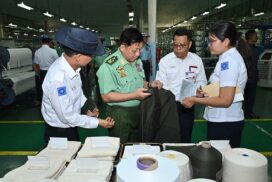It is an undeniable fact that there are found professional ethics in any job. A profession has three characteristics: extended training before admission to practice, a strong organization which is recognized as being able to speak for itself as a whole or which emphasizes ideals of service above personal gain, and a code of ethics or standards of conduct set up by practitioners and enforced by their representatives. Hence, teachers must be well-trained, including administrators, supervisors, curriculum developers, and researchers. Also, at each level of education, there should be a subject-wise organization for the task of modernizing the teaching of that subject. They must all have their code of ethics to be observed in the concepts of right and wrong, primarily in the moral rather than the legal sense. After all, educators need to be thoroughly familiar with their codes of ethics. Professional ethics will likely comprise five precepts of education, duties and responsibilities of the teacher.
By the first precept, the absolute obligation of the teaching profession is to guide students in pursuit of knowledge or skills to prepare them in line with the needs of society and help them become happy, useful, self-supporting citizens now that the ultimate strength of a nation lies in the social responsibility, economic competence and moral strength of its citizens. In fulfilling this precept, the teacher shall deal justly and impartially with students regardless of their physical, mental, emotional, political, economic, social, racial, or religious characteristics; encourage students to work for high goals in the development of their physical, intellectual, creative, and spiritual endowments; aid students to develop an understanding and appreciation not only of the opportunities and benefits from their freedom but also of their obligation to it; and accept no remuneration for tutoring except in accordance with approved policies of the government.
By the second precept, the members of the teaching profession share with parents the task of shaping each student’s purposes and acting towards socially acceptable ends, such that the effectiveness of many teaching methods depends upon cooperative relationships with the home. In fulfilling this precept, the teacher shall respect the basic responsibilities of parents for their children; seek to establish friendly relationships with the home; help to improve students’ confidence in their own homes and avoid disparaging remarks which might undermine that confidence; provide parents with the information that should serve the best interest of their children and be discreet with the information received from the parents; and keep parents informed about the progress of their children as interpreted in terms of school purposes.
By the third precept, the teaching profession occupies a position of public trust involving not only the individual teacher’s personal conduct but also the interaction between the school and the community because education is most effective when these relationships operate in a friendly, cooperative and constructive manner. In fulfilling this precept, the teacher shall adhere to any reasonable pattern of behaviour accepted by the community for a professional person; perform civic duties and participate in community activities with due consideration to the obligation to his students, family and himself; discuss controversial issues from an objective point of view; recognize that schools belong to the working people, encourage lay participation in school purposes, and strive to keep the public informed of the educational programme which is being provided; respect the community where he is employed and be loyal to the school, the community and the nation; and work to improve education in the community and strengthen the moral, spiritual and intellectual life of the community.
By the fourth precept, the members of the teaching profession have inescapable obligations with respect to employment. In fulfilling this precept, the teacher shall conduct professional business through proper channels; refrain from discussing confidential and official information with unauthorized persons; apply for employment on the basis of competence only and avoid asking for a specific position known to be filled by another teacher; professionally seek employment, avoiding such practices as the indiscriminate distribution of applications; refuse to accept a position when the vacancy has been created through unprofessional activity or the application of unjust professional practices and procedures; give and expect due notice before a change of position is to be made; be fair in all recommendations that are given concerning the work of other teachers; and engage in no gainful employment outside of his main duty in which the employment affects adversely his professional status or impairs his standing with students, associates and the community.
By the fifth precept, seeing that the teaching profession is distinguished from many other occupations by the uniqueness and quality of professional relationships among all teachers, community support and respect are influenced by teachers’ standards and their attitudes towards teaching and other teachings. In fulfilling this precept, the teacher shall deal with other members of the profession in the same member as he himself wishes to be treated; stand by other teachers who have acted on his behalf and at his request; speak constructively of other teachers but report honestly to a responsible person in matters involving the welfare of students, the education system and the profession; seek to make professional growth continuous with such procedures as study, research, conferences and attendance at professional meetings; and make the teaching profession so attractive in ideals and practices that sincere and able young people will want to enter it.
To a teacher, there are still some other duties left towards the State, the education department, the school, the headmaster, the inspectors, students, fellow teachers, parents, local administrative authorities and other departments. The teacher must devote his time and creative power to the course of educational progress, be enthusiastic about correcting the defects according to the instruction, train his students to be able to appreciate the aesthetic value of literature, music, or art and use their leisure time profitably in educational, health and social affairs; try to improve instruction effectively by studying educational literature and be helpful in block teaching and research work; know intimately the parents who are capable of contributing to the development of the school; and give local administrative authorities and other departments as much help as he can as well as take from them what is needed for the school.
What is more, a teacher’s responsibilities concerning school plants, facilities, class management, instructional activities, examination, financial matters, school council, PTA (Parent-Teacher Association), and auxiliary services may be varied and many. The teacher is responsible for maintaining school plants and facilities and making the best use of school properties. Only when permission from the headmaster is obtained may the school compound, school building, and school furniture be used outside school hours. One attendance register is to be kept by every class teacher, being properly marked on the spot. It is best if the teacher attends his duty punctually and regularly, reporting the absentee list to the school office without fail. Smoking in the classroom or drunken attending is strictly prohibited. Regular checking is necessary for cleanliness, student welfare, and ordered classroom maintenance. The teacher has to make wider use of teaching aids produced through concerted efforts as well. He must be a member of the subject committee to be fully acquainted with the syllabus. If he is given the assignment to serve as a substitute teacher, he ought to teach students efficiently. He should keep examination matters strictly confidential. As per financial matters, the teacher must adhere to them strictly. It is too unethical for a teacher to borrow money from parents or guardians. Finally, teachers in charge of educational organizations must actively participate in successfully performing the prescribed function.
The above-mentioned professional ethics are applicable as a guide for the teaching profession. Of course, composing a code of ethics is not quite an easy task. A code should cover all the essentials and also guide all phases of professional conduct. Educators must be the ethical ones who practice patience, courage, and sincerity and accept constructive criticism graciously. Obviously enough, every one of them ought to attempt to maintain high professional and ethical standards to make a more positive contribution to improving education in the school.
Professional Ethics Every Teacher Should Have Known
- January 21, 2024
- 534














